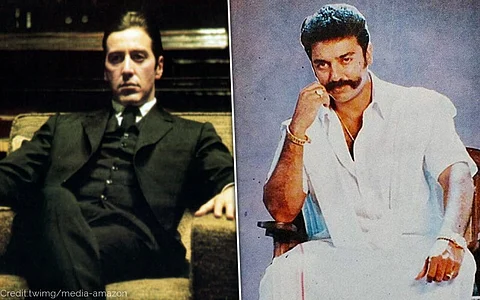
- Reviews
- Power List 2024
- Cannes 2024
- In-Depth Stories
- Web Stories
- News
- FC Lists
- Interviews
- Features
- FC SpecialsFC Specials

In Thevar Magan (1992), written by Kamal Haasan and directed by Bharathan, the long and bitter fight between the two families of Chinna Thevar and Periya Thevar ends in the only way it could have ended: the old fashioned way. In a dusty, windy patch of land, with the Old Gods of the violent country lending their weapons to the fight and standing there as witnesses, Sakthivel (Kamal Haasan) decapitates Maayan (Nasser) in one swipe of his sickle and fells him to the ground. But the movie doesn't end there, for the fight between the two families, which has now ended, is only one half of the story. The other, more important, half of the story is the conflict between Sakthivel and the feudal Old Order of his village community.
Comparisons have often been made between The Godfather and Thevar Magan, and yet the characters Michael Corleone and Sakthivel could not be more dissimilar. It is true Al Pacino's character initially keeps a distance from his father, but when circumstances force him to take up the mantle, he doesn't think twice about it. He is perfectly at home in his father's world to make it his own. He quickly establishes his own authority. He doesn't have any fundamental qualms about the way the game is played, so to speak. In fact, after signing up, Michael plays the game so efficiently and so ruthlessly he evokes the same terror and awe his father did. None of these things could be said about Kamal Haasan's character in Thevar Magan. In fact, here the opposites are true.
Sakthivel is characterised by his stubborn refusal to 'play the game' he is expected to play, which is what defines him, and which is what makes Thevar Magan a very different film with very different concerns and ambitions. It is just not a localised The Godfather.
When Esakki (Vadivelu) of Periya Thevar's side loses his hand for breaking the locks of a closed temple, retributive violence breaks out and the huts of the other side are torched. That is how the game is played (by the Thevars of Thoovalur). Like Maayan says, "adikku adi kodukkalaina, apparam ennaya thevan?" (What is the point of being a Thevan if you can't hit back immediately/proportionately?) Whereas, when Sakthivel visits Esakki in the hospital, he asks, "police-kku solliyachilla?" (Have we informed the Police?) That is not how the game is played at all. Esakki had to inform Sakthivel that justice could only be obtained through Panchayat or the sickle. Sakthivel understands the game soon enough, but that only strengthens his resolve to not play it. No Panchayat, no sickle for him.
When Chinna Thevar's side respond to their huts being torched by flooding the other side's huts, Sakthivel quickly catches one of the perpetrators and hands him over to the police, much before his own side goes for revenge and 10-15 people lay dead on either side. When Maayan blocks Sakthivel's side of the villagers from accessing the main road with a 'tough fence', Sakthivel arranges a marriage with a bride from the other side and removes the fence. When Maayan ensures the bridegroom doesn't show up at his own wedding, Shakthivel ends up marrying the girl. It is only when bombs go off at the temple car festival that Sakthivel is enraged enough to pick up the sickle. Even then, he ends up rescuing Maayan's family from his own people baying for blood. Then, when Maayan shows up at Sakthivel's place swearing to take the latter's life, Sakthivel repeatedly asks him to surrender himself to the police. Resolute to the end.
The final stretch of the final fight between Sakthivel and Maayan has a touch of larger-than-life quality to it. The wind, the sand, the hills in the background, the Gods, the weapons. There are several high angle shots of the fight as if the Gods themselves were watching the show. Sakthivel seems to be fighting his fate itself, rather than a human being in Maayan. When Maayan's head flies off and the headless body falls to the ground, Sakthivel also falls down at the feet of the Gods like a defeated man. In a stunning reversal of commercial cinema convention, according to which villain losing his head would have symbolised victory for the hero, here it feels rather like a defeat. And it is a defeat indeed.
Esakki, Ramu, and others soon turn up at the site, offering to take the blame for the murder, asking Sakthivel to leave before the police arrives. However, Sakthivel decides to turn himself in to the authorities. (The New Order.) Only that would count as a victory in his larger fight against the sickle culture of his community, practised with impunity until then. He bears the sickle like a cross and walks towards the police van. Send your kids to school, he says to his people who follow him. Enough of this bloodletting.
He is then arrested, handcuffed, and taken away in the same train in which he arrived at his village a few months ago to much fanfare, with his punk hairstyle, hotelier ambitions, and a Telugu girl in tow. That feels like ages ago now. 'Potri paadadi ponne' plays in the background.